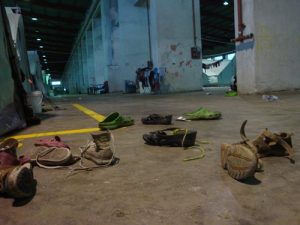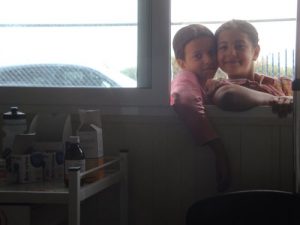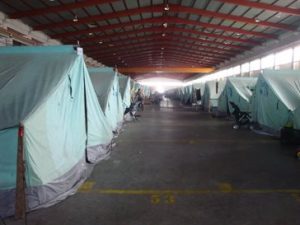Representing Refugees
 One of the things I’ve noticed on returning from any big trip is that most people aren’t that interested in hearing about what’s happened. They don’t want a half-hour diatribe on all the stuff I’ve done and seen nor even hear stories that moved me. There’s no time for all that.
One of the things I’ve noticed on returning from any big trip is that most people aren’t that interested in hearing about what’s happened. They don’t want a half-hour diatribe on all the stuff I’ve done and seen nor even hear stories that moved me. There’s no time for all that.
When I said I was going to volunteer in Greece for a couple of months helping to provide healthcare for Syrian refugees, lots of people said they looked forward to hearing about it but most didn’t mean it. I thought I should share my observations but instead of boring people about it on my return, I could write about my experiences as they unfolded. I would describe what life was like in the camps.
So I resolved to write. On the plane to Thessaloniki I wrote about what I was expecting. I knew I was heading for a tough assignment. I wrote about my nervousness, wondering what I was going to have to cope with? How well would I cope?
My plane touched down in Thessaloniki after 10pm and I was expected to be on my way to work at 08.15am next morning. I didn’t – couldn’t – manage any writing during the first week or so. It was so full-on. I was working harder than I had for decades. I was working with people whose culture was new to me. Their body language was confusing. I had to speak through interpreters. Even our excellent interpreters sometimes found it hard to the refugees’ symptoms and ideas about how their bodies worked. I was reeling not only from the volume of work but also from trying to understand and empathise with my patients. Yet I had no time to listen to their stories, much as I wanted to. I could only imagine what they had been through.
 My head was a whirling mass of impressions, pieces of stories, images of wounded bodies and bewilderment at how these people expressed their stress and distress. Medicine packets were often labelled in Greek and some drugs were unknown to me. I was also constantly questioning how effective I was being. Was my approach kind enough? How could I best help them? I fell into bed early each night, and slept like the dead.
My head was a whirling mass of impressions, pieces of stories, images of wounded bodies and bewilderment at how these people expressed their stress and distress. Medicine packets were often labelled in Greek and some drugs were unknown to me. I was also constantly questioning how effective I was being. Was my approach kind enough? How could I best help them? I fell into bed early each night, and slept like the dead.
I contemplated my perennial problem, of respecting patient confidentiality while sharing true stories. Yes, I could write generically about how people express their mental pain as physical pain. How refugees collapse because their anxiety is so debilitating. How they ask for sleeping pills because of all the mental anguish, and the noisiness of the camp. How they unknowingly exaggerate symptoms, symptoms I was used to reading in order to make a diagnosis. But generic writing doesn’t change hearts and minds. It does little to help others’ understanding of the plight of the refugees.
I had to write stories about people. Readers would want to ‘meet’ my patients. They’d want to imagine the angry frustrated fathers who resented the fact that I wouldn’t give antibiotics for the flu. They’d want to imagine the prematurely aged old woman (who was the same age as me) who had lost her home in Aleppo who had lost her livelihood, her husband and all her children. My readers would want to see the tears running into her black hijab. Hear her, ‘God is great,’ help combat her hopelessness.
 I was mindful of confidentiality but my patients were keen to tell their stories. The refugees want the world to know they are stuck in Greece, unable to join relatives in Germany or Scandinavia or elsewhere in Europe. They are prevented, even, from returning to the war zone. It felt like my duty to write for them.
I was mindful of confidentiality but my patients were keen to tell their stories. The refugees want the world to know they are stuck in Greece, unable to join relatives in Germany or Scandinavia or elsewhere in Europe. They are prevented, even, from returning to the war zone. It felt like my duty to write for them.
Writing helped me too. It allowed me to digest and ponder on my work. When I found myself questioning my responses to the refugees, and to my colleagues, writing helped me clear my mind. And it helped keep the freshness of the stories sharp for me. Writing was therapeutic and helped this physician cure herself too, while some of my colleagues struggled, became exhausted and unwell. Humanitarian work is sapping. Burnout is common but my writing did, I think, help protect me.
My big regret was that I was so busy doing my job, that I didn’t have time to listen to all the amazing stories that many authors would have died for. Usually at the end of the day it took discipline to write even the half stories I’d heard. Absorbing all the refugees’ frustrations, hurt and hearing their heart-breaking tales was tough but I hope I’ve represented the refugees faithfully.
If you’d like to be introduced to some of my patients, some appear in my blog posts for September to November at www.wilson-howarth.com/blog. I trust you enjoy meeting them.
—

Jane on her day off
Jane Wilson-Howarth is a physician who has practised in England, Sri Lanka, Nepal and most recently in Greece.
Category: Contemporary Women Writers, On Writing

























Thank you for your work and for sharing your experience. It’s beyond tragic what’s happened in Syria. I watched some news coverage today and can’t comprehend how Assad, supported by Putin, is crushing Aleppo. How anyone survives the bombing is a miracle.
How can the UN and other peacekeepers stand by and watch a devastation, a mass homicide, and do little to stop it? With what we know about other genocides and wars, you’d think we’d have some idea by now of what to do to save peoples’ lives. By not stepping in before it got so crazy, we’ve created a situation worldwide that has become difficult to manage. How to support all these refugees? How to give them comfort and a fresh start elsewhere? It’s mind-boggling.
Wishing you the best and good luck on your writing.
Thank you Diana for your heart-felt response and I am with you on feeling bewildered and impotent. Who knows whether stepping in is a good or a bad thing! I suppose we all need to try to press for peace and agitate for out governments to stop the bombing. I found it especially poignant to read that Greece itself has experienced such turmoil and two waves of ethnic cleansing – around 1922 and during the 2nd world war. The only thing anyone seems to learn from history is that no-one learns anything from history.